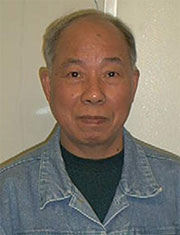Jing was a student with 20 years of previous formal education. Before immigrating to the US, he was a professor at Beijing University in Geological Engineering. After arriving in the US, he studied in the ESOL program at Portland Community College (PCC) for two years (winter 2003-winter 2005).
Some features of his classroom comportment show his experience in formal educational settings. He understood the classes as involving literacy and came to the classroom with textbook, notebook, and writing tools. For the first five weeks of his first term of study, he sat at the same desk (second from the front) consistently without being instructed to do so by the teacher. In his pair interactions, he was usually very focused on completing the task as it was assigned by the teacher showing his orientation to the teacher as the leader of the classroom.
There is evidence of the important role of literacy in Jing's world displayed in his behavior in the classroom before class and during the ten-minute break in the middle of the class. While other students come into the classroom and remain at their desks, Jing spends this time interacting with printed material and maps on the walls of the classroom, with books and magazines located on shelves throughout the classroom, and with his own books at his desk. This is not to suggest that he is asocial in his interactions at these times. Often, his interactions with various forms of printed material around the classroom were catalysts for face-to-face spoken interactions with peers.
English language classes were an important context for his English language use. Jing reported that he used English the most in his life when he was taking ESL classes at Portland Community College.
Jing had a sophisticated understanding of classroom learning - seeing learning English as acculturation and exchange. This is especially apparent in the way he talked about his interactions in Portland society. But he also understood the larger pedagogical implications of the use of conversation partners in his ESOL class. While students were likely to speak about conversation partners as coming in the classroom to 'teach us English', Jing portrayed this as an exchange saying that the "Portland State University students come to teach us and learn with us in each class. Through these topics [Asian culture, comparison of emotions, music, the environment] the Portland State University students talk with us and with each other".
